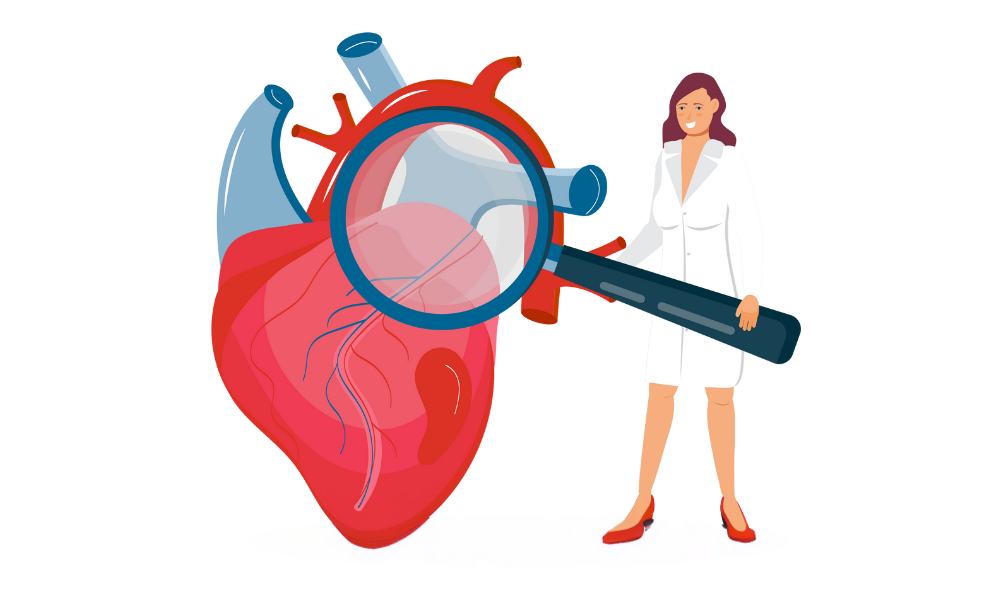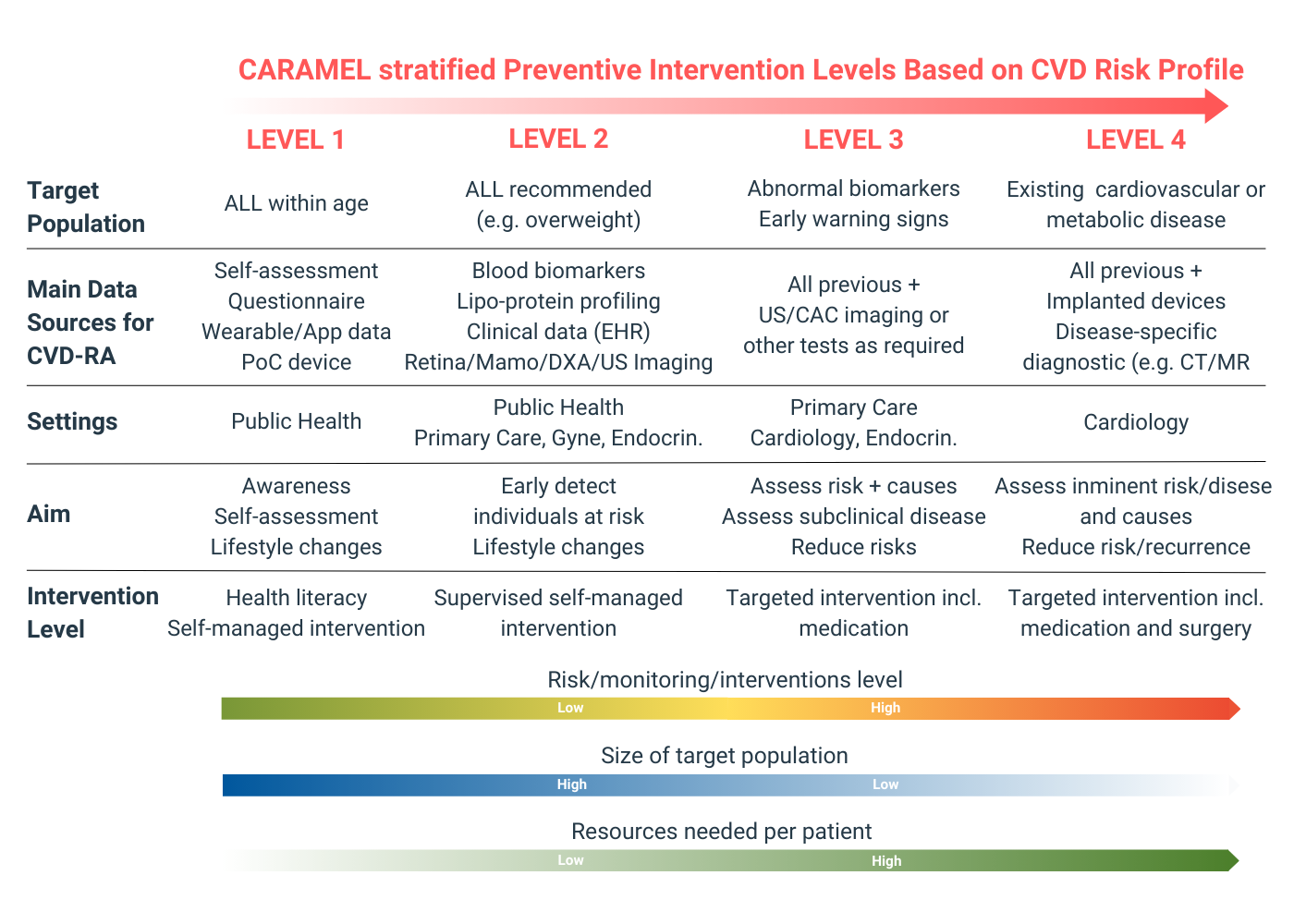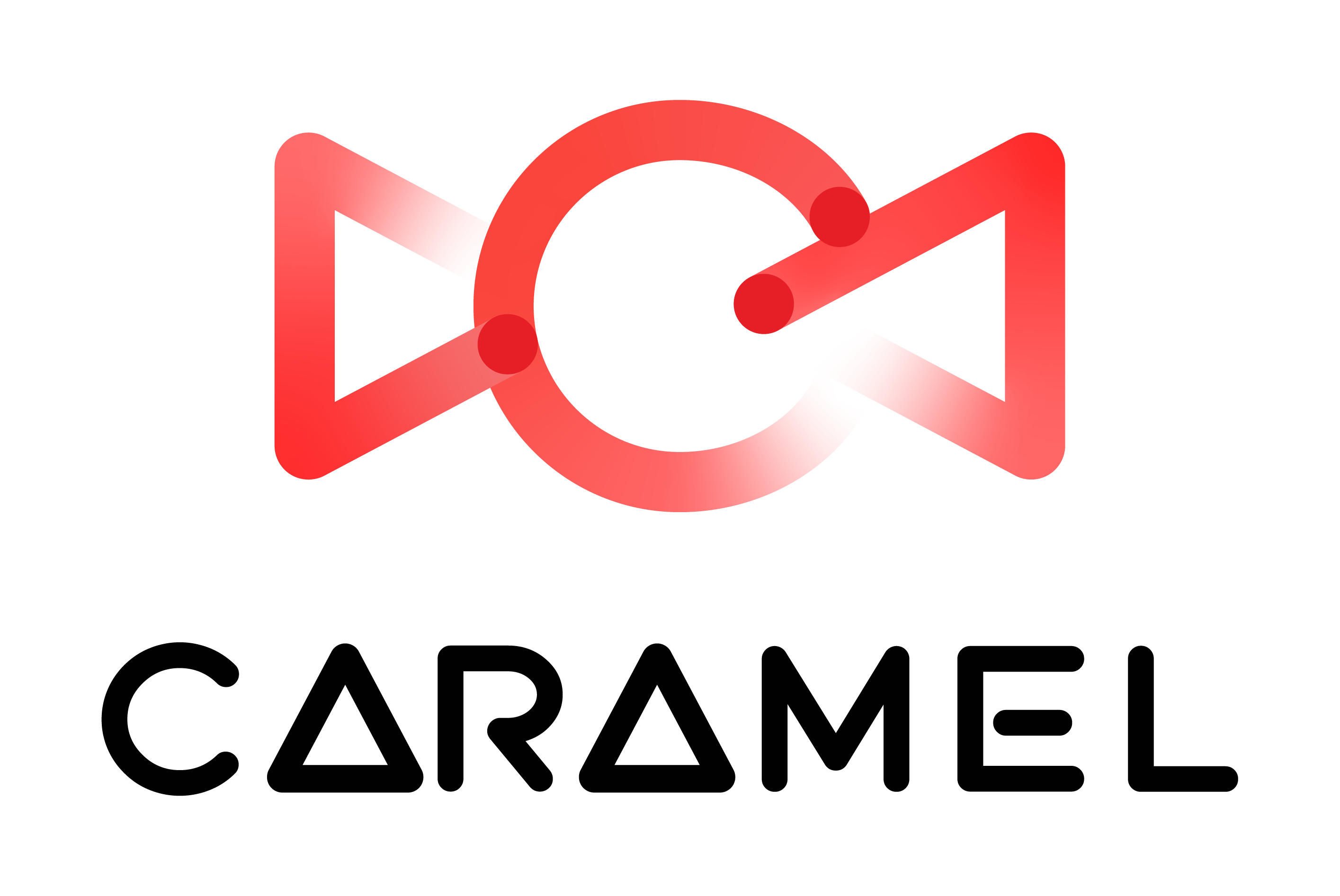CARAMEL project
A new approach to women’s cardiovascular health
CARAMEL (CArdiovascular Risk Assessment via multimodal data analysis enabling personalized prevention strategies targeting MEnopausaL women) is an EU-funded research initiative under Horizon Europe’s Health Cluster. The project aims to transform cardiovascular disease (CVD) prevention for women aged 40-60 by leveraging artificial intelligence (AI), advanced biomarkers, and digital health tools to develop personalised, data-driven prevention strategies.
CVD is the leading cause of death among women in Europe, with an especially sharp increase in risk during and after menopause. Despite these realities, CVD remains underdiagnosed and undertreated in women, as current risk models often lack consideration for sex- and gender-specific factors. CARAMEL aims to close this gap by creating tailored risk assessment models that are uniquely suited to the needs of middle-aged women.


CARAMEL’s journey will involve several key milestones, including the development of a digital prevention platform and an App for self-monitoring and self-care. The project stands out by actively involving women in the co-creation of the CARAMEL digital tools, ensuring their experiences and preferences are at the core of its solutions. Moreover, CARAMEL will also consider the specific needs of women with intellectual disabilities, whose feedback about their experience of menopause will be collected.
CARAMEL’s journey will involve several key milestones, including the development of a digital prevention platform and an App for self-monitoring and self-care. The project stands out by actively involving women in the co-creation of the CARAMEL digital tools, ensuring their experiences and preferences are at the core of its solutions. Moreover, CARAMEL will also consider the specific needs of women with intellectual disabilities, whose feedback about their experience of menopause will be collected.

CARAMEL’s methodology
CARAMEL leverages cutting-edge technologies and a multimodal data strategy to enhance CVD risk
prediction. By analysing a broad range of clinical, biological, and lifestyle data, the project aims to
identify hidden risk patterns and develop tailored prevention strategies for women aged 40-60 in
menopause or perimenopause.
Multi-source data collection and integration

CARAMEL collects and harmonizes data from diverse sources, including:
- Electronic Health Records (EHRs): Real-world clinical data from large retrospective and prospective studies.
- Biomarkers & lipoprotein profiling: Advanced molecular indicators of cardiovascular risk, including Nuclear Magnetic Resonance (NMR) spectroscopy-based lipoprotein profiles and inflammation markers.
- Medical imaging: Magnetic Resonance, Dual X-Ray Absorptiometry, ultrasound, mammography, cardiac imaging as well as other advanced techniques to detect early vascular changes.
- Cardiac implanted devices: Data from pacemakers, Implantable Cardioverter-Defibrillators (ICDs), Implantable Loop Recorders (ILRs).
- Novel diagnostic technologies: Retinography (eye fundus) analysis and skin volatilomics-based analysis for detection of biomarkers.
- Wearables & digital health data: Continuous monitoring of heart rate, physical activity, sleep, and lifestyle patterns.
- GeoAI data: Analysis of geolocated environmental and socioeconomic factors influencing cardiovascular risk.
Artificial Intelligence (AI) for risk prediction

CARAMEL develops multiple AI-powered models to analyse complex datasets and generate personalised risk scores:
- Cardiovascular Disease-Risk Assessment (CVD-RA) AI models: Predict individual cardiovascular risk based on multi-source data.
- Image-based AI models: Deep Learning models trained on medical imaging to detect subclinical atherosclerosis and early-stage CVD.
- Signal-based AI models: ECG,wearable and implanted devices’ data analysis to detect heart rate variability and stress markers.
- Disease trajectory analysis: AI models trained on longitudinal EHR data to predict disease progression over time.
Clinical validation & real-world implementation

The project is tested through four types of clinical studies:
- Mixed-method (CARAMEL-WOMEN): Identify women’s risk factors, experiences, needs, barriers and gaps in cardiovascular prevention and determine overall requirements.
- Retrospective study (CARAMEL-RS): AI model training on existing real-world data (Electronic Health Records, imaging, biomarkers, biobank samples).
- Observational study (CARAMEL-OS): Prospective validation of AI models using multi-source data from 3,000 women at different risk levels.
- Interventional study (CARAMEL-IS): A Randomised Clinical Trial testing a digital self-management strategy combining AI-driven risk assessment, health coaching, and behavioural interventions.
From data to personalized prevention
CARAMEL aims to develop and validate a stratified approach for cardiovascular disease (CVD) prevention in women during the menopause transition (40-60 years). By leveraging advanced diagnostic technologies (molecular biomarkers, imaging, wearable data, eye fundus analysis, volatolomics) and digital data sources (EHRs, cohorts, registries, biobanks), the project will enhance risk prediction and prevention strategies through cutting-edge AI and computational modelling.
The effectiveness of these innovations will be tested through clinical studies, including observational and interventional trials, ensuring their real-world applicability.
CARAMEL’s key objectives
- Developing AI-driven risk stratification
CARAMEL will integrate multi-source data and state-of-the-art AI models to create personalized CVD risk assessment tools, tailored to women’s sex and gender-specific risk factors and health trajectories. - Building a personalised prevention framework
A stratified prevention model will be designed to address different risk levels, incorporating primary and secondary prevention strategies while ensuring clinical applicability and real-world validation. - Empowering women through digital health tools
A self-assessment and self-management app will enable women to track their cardiovascular health, access tailored recommendations, and adopt preventive measures with the support of health coaching and behavioural interventions.


- Enhancing clinical decision support
CARAMEL will develop clinical decision support systems (CDSS) to assist healthcare professionals in delivering personalised, gender-sensitive cardiovascular prevention and treatment plans. - Addressing gender-specific barriers in CVD prevention
The project will integrate a gender in research perspective, acknowledging social, psychological, and biological factors that contribute to disparities in women’s cardiovascular health and treatment. - Influencing policy and clinical guidelines
By generating evidence-based recommendations, CARAMEL will contribute to updating public health policies and clinical guidelines, ensuring that novel AI-driven risk models and digital tools are integrated into routine healthcare practices.
Through this comprehensive approach, CARAMEL will bridge
the gap between data science and clinical practice, paving
the way for personalised, AI-powered cardiovascular
prevention for women.
- Enhancing clinical decision support
CARAMEL will develop clinical decision support systems (CDSS) to assist healthcare professionals in delivering personalised, gender-sensitive cardiovascular prevention and treatment plans. - Addressing gender-specific barriers in CVD prevention
The project will integrate a gender in research perspective, acknowledging social, psychological, and biological factors that contribute to disparities in women’s cardiovascular health and treatment. - Influencing policy and clinical guidelines
By generating evidence-based recommendations, CARAMEL will contribute to updating public health policies and clinical guidelines, ensuring that novel AI-driven risk models and digital tools are integrated into routine healthcare practices.
Through this comprehensive approach, CARAMEL will bridge
the gap between data science and clinical practice, paving
the way for personalised, AI-powered cardiovascular
prevention for women.




